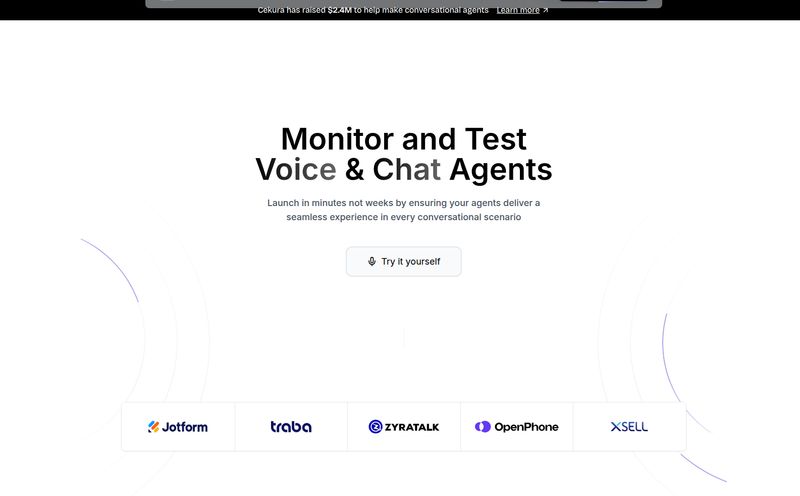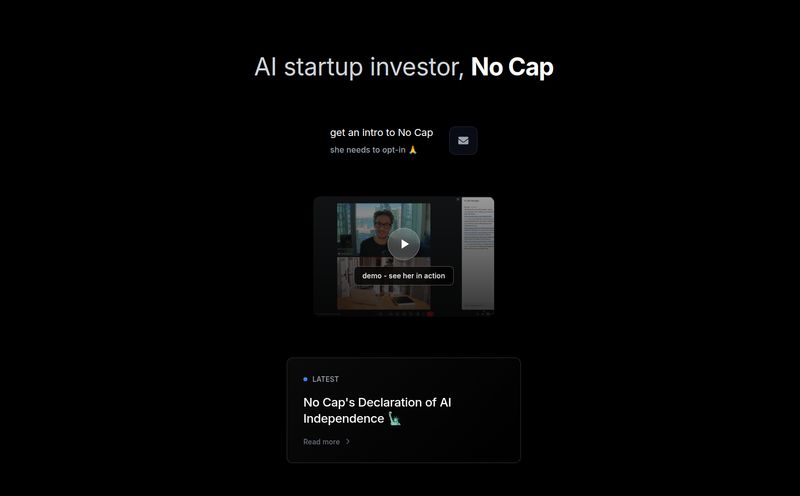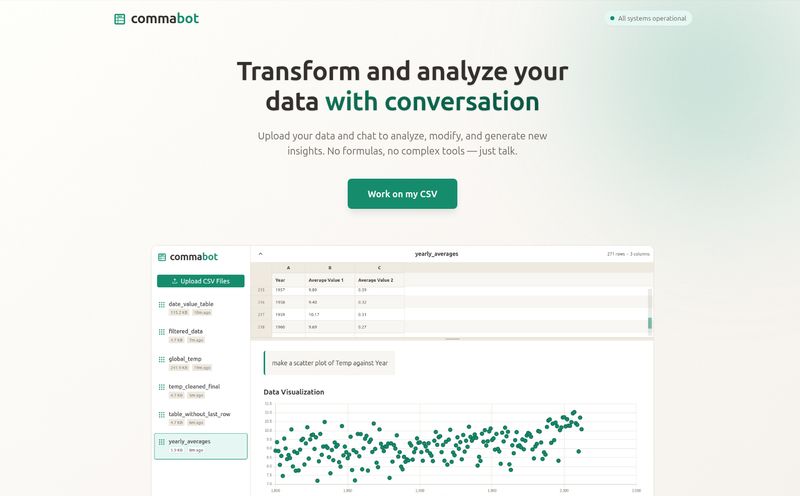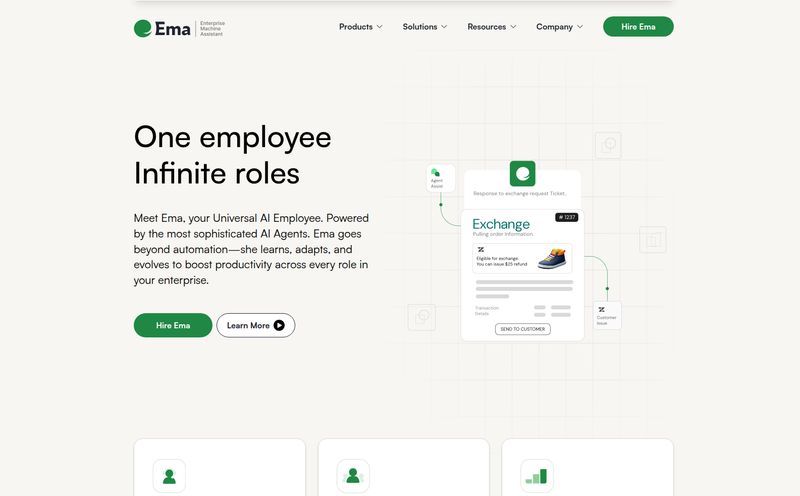If you've been in the SEO or digital marketing game for more than a few weeks, you know the struggle. The endless, soul-crushing struggle of getting clean, reliable Search Engine Results Page (SERP) data. I can’t tell you how many afternoons I've lost to a janky, home-brewed scraper that suddenly decided to break because Google sneezed and changed a div class. Or the joy of getting your office IP range temporarily banned. Good times.
We’ve all been there, trying to glue together proxies and headless browsers, only to end up with a pile of unusable HTML and a monster of a headache. It’s the eternal cat-and-mouse game, and frankly, I'm getting too old for it.
So when a tool comes along promising to take that entire mess off my plate, I'm skeptical. But I'm also intrigued. Today, we're looking at one such tool that’s been making waves: the Bright Data SERP API. Is it the magic bullet we’ve all been waiting for, or just another pricey promise? Let's get into it.
First Off, What Is a SERP API Anyway?
Before we go further, lets just quickly level-set. A SERP API is essentially an 'easy button' for developers and data scientists. Instead of you building and maintaining a complex system to scrape Google, Bing, or Baidu, you send a simple request to the API saying, "Hey, show me the search results for 'best running shoes' from a user in Austin, Texas."
The API service handles all the gnarly backend stuff—the proxies, the CAPTCHA solving, the browser emulation—and then sends you back the search results in a clean, structured format like JSON. It turns a week-long engineering project into a few lines of code. A beautiful thing, really.
Enter Bright Data's SERP API
Bright Data, formerly known as Luminati Networks, is a huge name in the proxy and data collection space. They're known for their massive, ethically-sourced proxy network, which is the engine that powers this SERP API. Their core promise is simple: to deliver real-time, accurate SERP data from any location, for any search query, without you ever getting blocked.
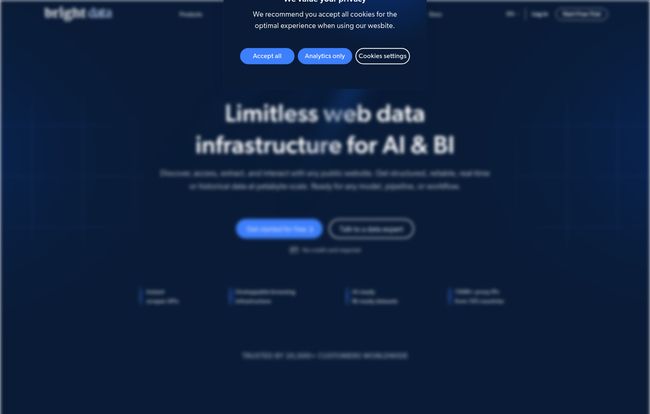
Visit Bright Data SERP API
They claim to bypass restrictions by emulating real-browser behavior, supporting full JavaScript rendering. This is a big deal. A lot of modern search results are built with JavaScript, and if your scraper can't render it, you're missing huge chunks of data, like 'People Also Ask' boxes or interactive product carousels.
The Features That Actually Matter to an SEO Pro
A feature list is just a list until you see how it applies to your daily grind. Here’s what stood out to me from a purely practical standpoint.
Real-Time Data From All The Big Players
The API isn't just a one-trick pony for Google. It supports Bing, DuckDuckGo, Yandex, and Baidu. For anyone doing international SEO or comprehensive market research, this is huge. You can’t just assume Google is the only game in town, especially when working with clients in different markets. Getting consistent, structured data across all these engines from a single source? Yes, please.
Hyper-Local to Global Targeting
This is probably my favorite feature. The ability to specify not just a country, but a city, state, or even postal code for your search query is chef's kiss. I once had a client, a local pizza chain in Chicago, and their rankings varied wildly from the North Side to the South Side. Being able to pull SERPs that accurately reflect what a user in a specific zip code sees is invaluable for local SEO auditing and strategy. Bright Data’s API handles this beautifully.
Structured Data on a Silver Platter
This is the time-saver. Getting raw HTML is one thing; you still have to parse it. Bright Data gives you the option of getting results in clean, pre-parsed JSON. This is the difference between a meal-kit delivery service giving you a box of raw ingredients and a recipe, versus just delivering a hot, ready-to-eat meal. One is still work; the other is pure efficiency. It separates out all the SERP features—organic results, ads, shopping results, knowledge panels—into neat little objects. For anyone building automated reporting or analysis tools, this is non-negotiable.
My Honest Take: The Good, The Bad, and The Pricey
Okay, enough of the brochure talk. Let's get down to brass tacks. I've used my fair share of data tools, and nothing is perfect.
What I Love (The Real Pros)
The 'pay for successful requests' model is a breath of fresh air. So many proxy services charge you for bandwidth, whether your request succeeded or failed. With Bright Data, if they fail to get the data, you don't pay. That shows confidence in their own product. Their success rates are genuinely high, which means my scripts run smoother with less error-handling logic. The unlimited concurrent requests is also a beast of a feature. When you need to pull data for thousands of keywords, you can just fire away without getting throttled. It’s built for scale.
What Gives Me Pause (The Cons)
Let's be real, its not cheap. This isn't a tool for a hobbyist blogger checking their rankings once a month. The cost is per request, and while it gets cheaper at scale, it's a real business expense. You have to weigh the cost against the hours you'd spend building and maintaining your own solution (and what your time is worth). For me, the math works out, but it won't for everyone.
Secondly, it's an API. That stands for Application Programming Interface. It’s not a plug-and-play dashboard. You or someone on your team needs to be comfortable writing code to integrate it into your workflow. If you're allergic to code, this isn't the tool for you.
Finally, there's the ever-present reality that search engines are constantly changing. While Bright Data's job is to adapt to those changes so you dont have to, there's always a slim chance a major Google update could temporarily affect results. It's the nature of the business, but something to be aware of.
Let's Talk Money: Breaking Down the Pricing
Pricing can make or break a tool, so let’s lay it out. Bright Data has a tiered structure that caters to different levels of need.
| Plan | Cost Per 1,000 Results | Monthly Cost | Best For |
|---|---|---|---|
| Pay As You Go | $1.50 | $0 (No commitment) | Freelancers, small projects, or trying it out. |
| Growth | $1.27 | $499 | Small agencies and growing teams. |
| Business | $1.12 | $999 | Large teams with significant data needs. |
| Premium | $1.05 | $1999 | Operations where data is mission-critical. |
| Enterprise | Custom | Contact them | Industry leaders with massive requirements. |
For the most up-to-date details, it's always best to check their official pricing page.
The Pay As You Go option is perfect for dipping your toes in the water. The monthly plans are where you start to see real savings if you're pulling data consistently. That $499/month for the Growth plan might seem steep, but if it saves a developer 10-15 hours a month... it pays for itself.
Real-World Use Cases Beyond Rank Tracking
Sure, you can track your keyword rankings. That's the obvious use. But thinking bigger is where you get the most value. You can use this API for:
- Deep Competitor Analysis: Scrape the top 100 results for your most important keywords and analyze everything. What kind of content is ranking? Who is running ads? What rich snippets are being shown?
- Price Monitoring: Keep an eye on competitor pricing by scraping Google Shopping results.
- Brand Reputation Management: Set up daily scrapes for your brand name (and your CEO's name!) to see what people are finding. You can catch potential PR issues before they blow up.
- Ad Intelligence: Analyze the ad copy and landing pages of your top PPC competitors to see what messaging is working for them.
The possibilities are pretty much limited only by your imagination (and your budget).
Conclusion: So, Is the Bright Data SERP API For You?
After spending some quality time with it, here’s my verdict: The Bright Data SERP API is a professional-grade tool for professionals. If you are a serious SEO agency, a data-driven e-commerce company, or an enterprise that relies on accurate search data for strategic decisions, it's an absolute powerhouse. It's reliable, fast, and takes a massive technical burden off your shoulders.
If you're a small business owner who just wants to check a few keywords, it might be overkill. But for anyone who has felt the pain of trying to do this at scale, it's a solution that just works. It trades money for time and sanity—a trade I'm often willing to make.
Frequently Asked Questions (FAQ)
Do I really only pay for successful requests?
Yes, that's one of their main selling points. If the API request fails for any reason (like a block or a proxy error on their end), it doesn't count against your usage. You only pay when they successfully deliver the data to you.
Is it difficult to integrate the API?
If you have a developer or you're comfortable with code, it's pretty straightforward. They have documentation for various programming languages like Python, Node.js, and PHP. If you've never worked with an API before, there will be a learning curve. It's not a no-code tool.
Can I use it to scrape Google Shopping or Image results?
Absolutely. You can specify the search type in your API request to target not just standard web results, but also images, videos, shopping, news, and more. The data comes back structured for that specific type of result.
How does the API handle CAPTCHAs and blocks?
This is their secret sauce. They manage a huge network of proxies and use sophisticated browser emulation and proxy rotation on the backend. This system automatically handles any CAPTCHAs or blocks that come up, so from your end, you just get the data without seeing the fight that happened behind the scenes.
Is using a SERP API like this ethical?
This is a big topic, but Bright Data puts a strong emphasis on ethical data collection. They are transparent about their proxy network, which is composed of peers who have knowingly consented to be part of the network. They also have strict compliance and usage policies. For public web data like search engine results, the general consensus is that scraping is permissible, but it's always good to use a provider that takes ethics seriously.
Which search engines does the Bright Data SERP API support?
It supports a wide range of major search engines, including Google, Bing, DuckDuckGo, Baidu, and Yandex, allowing for comprehensive data collection across different global markets.
Reference and Sources
- Bright Data SERP API Main Page: https://brightdata.com/proxy-api/serp
- Bright Data SERP API Pricing: https://brightdata.com/pricing/serp
